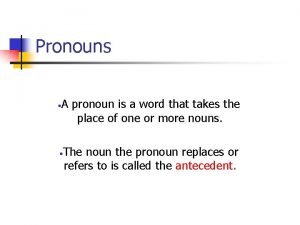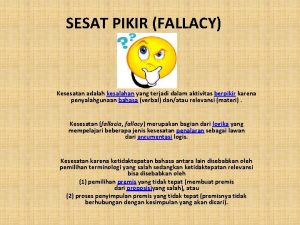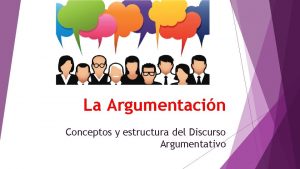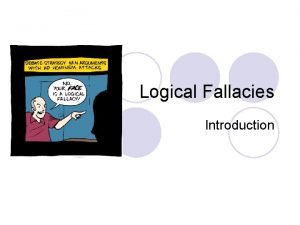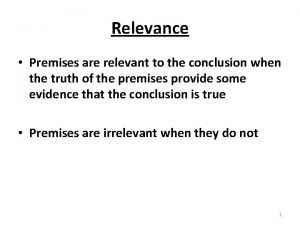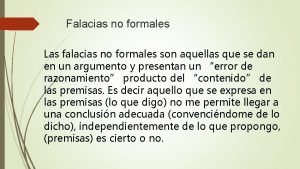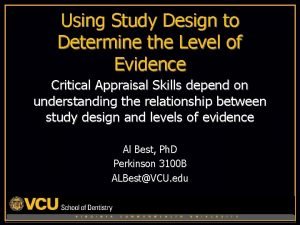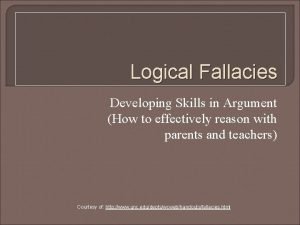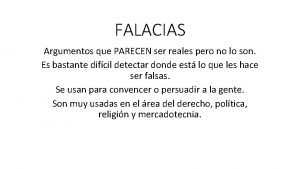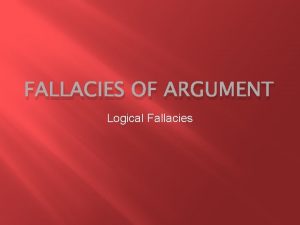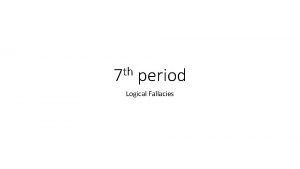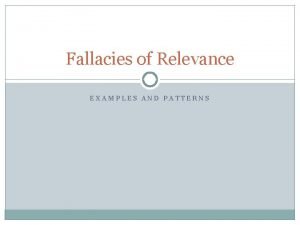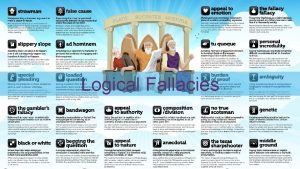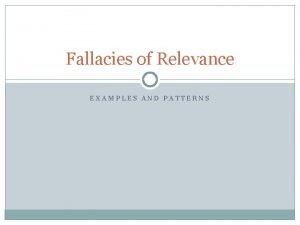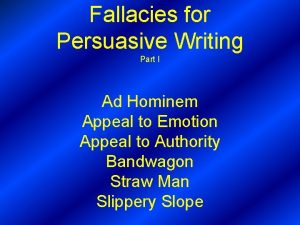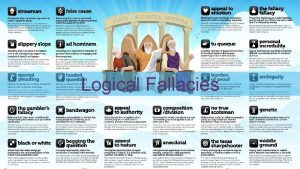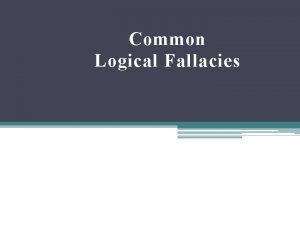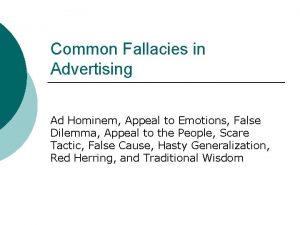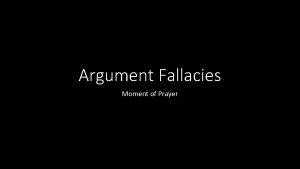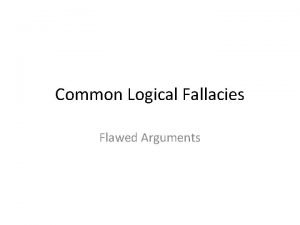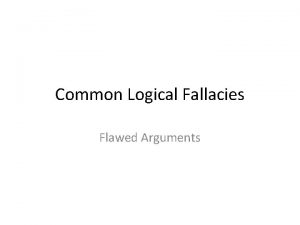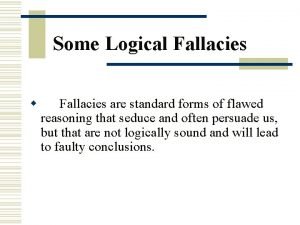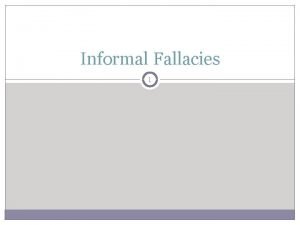Fallacies Pt 2 Ad hominem To the person

























- Slides: 25

Fallacies, Pt. 2

Ad hominem § “To the person” § Generally speaking: Inferring something about a claim from something about the person making the claim § Several varieties

Personal Attack Ad hominem § Direct attack on one’s opponents by observing some negative feature of them § Example: § Mr. Bowman is. . . §. . . a womanizer. §. . . a drunk. §. . . a racist. § Therefore, what he says is false. (This conclusion is often left implicit. ) § But negative features of someone need not correlate with falsity in what that person says.

Inconsistency Ad Hominem 1/2 § Attacking one’s opponents by pointing out that they have previously endorsed the opposite of what they now say § Example: § Mr. Bowman previously voted against gay marriage. § Therefore, it is false that he is (now!) in favor of gay marriage. (Again, this conclusion is often left implicit. ) § But people can change their minds!

Inconsistency Ad Hominem 2/2 § One might attack not what one’s opponents have previously said but what they do. § Example: § Ms. Doe claims to support the reversal of Roe v. Wade. § But Ms. Doe has herself had an abortion! § Therefore, she does not after all support the reversal of Roe v. Wade. § “Tu Quoque” § But the fact that Ms. Doe has had an abortion shows neither that abortion ought to be legal nor that Ms. Doe believes that it ought to be legal.

Circumstantial Ad hominem § Inferring the falsity of a claim from some fact about the circumstances of the person making the claim § Example: § Ms. Doe lived in Canada for many years. § Therefore, nothing she says about how the health care system ought to be can be trusted. § But the fact that Ms. Doe lived in Canada for many years is no evidence that her views on health care reform are illegitimate (even if her time in Canada had some influence on those views).

Poisoning the Well § Moore/Parker: “Ad hominem in advance” § Rejecting what someone says because we have antecedently received unfavorable information about that person

“Positive” Ad hominem § Just as one may fallaciously infer that some claim is false from the fact that the person making the claim has some negative feature, so too one may fallaciously infer that some claim is true from the fact that the person making the claim has some good feature. § Suppose that you are a Democrat. If so, then the fact that Bob is a Republican is no reason to disbelieve what he says on any particular issue. Moreover, the fact that Thomas is a Democrat is no reason to believe what he says on any particular issue.

Genetic Fallacy 1/2 § Inferring the falsity of a claim from the fact that the claim’s source has some negative feature. § Different from ad hominem at least where source is not a particular person but is rather a group, club, time period etc.

Genetic Fallacy 2/2 § Example: § The belief that God exists first arose in pre-scientific, superstitious times. § Therefore, God does not exist. § The origin (or genesis) of a claim has nothing to do with its truth/falsity. § Note: It is good to know one’s sources! Such knowledge may legitimately make us suspicious. But it cannot affect the truth-value of what is said.

Straw Man § Distorting an opponent’s view into something less defensible (for the purpose of making “it” easier to refute) § Those against gay marriage need not hate gays. § Those in favor of gun control need not think that only police should have guns. § Those who support “the right to choose” need not think that human fetuses have no value at all. § Those who support “the right to life” need not think that human fetuses are more important than human adults.

False Dilemma 1/6 § Fallaciously restricting one’s (or one’s opponents’) options to two, when in fact there are more to consider § Many equivalent ways of expressing this: § § Either X or Y Either Y or X If not X, then Y If not Y, then X

False Dilemma 2/6 § Examples: § Either you think abortion is always wrong or you have no problem with mothers murdering their children. § If you don’t take that flight, then the terrorists win. § If you’re not a vegetarian, then you have no objection to animals’ suffering. § If you’re not part of the solution, then you’re part of the problem.

False Dilemma 3/6 § Contrast with a genuine dilemma: § Example: § Either Smith or Jones was the murderer. § Jones was out of town when the murder happened. § Thus, Smith was the murderer. § This is good reasoning!

False Dilemma 4/6 § Contradictories vs. Contraries: § If A and B are contradictories, then exactly one of them is true (and exactly one of them is false). § Example: All men are mortal and Some man is immortal § If A and B are contraries, then it cannot be that both are true (though both may be false). § Example: All men are mortal and All men are immortal § A true dilemma can often be changed into a false one by replacing contradictories with contraries.

False Dilemma 5/6 § Special Case: Perfectionist Fallacy § Fallaciously downgrading or rejecting some proposed plan because it is not perfect § Example: § Juries will sometimes get the wrong result. § Therefore, we ought not to have trials by jury. § False Dilemma: Either the plan will work perfectly or it is to be rejected.

False Dilemma 6/6 § Special Case: Line-Drawing Fallacy § Inferring from there being no precise distinction that can be drawn that there is no distinction that can be drawn at all § Remember vagueness! The fact that we cannot draw a precise line between the bald and the non-bald does not show that there is no distinction to be drawn here at all. On the contrary, there are bald people and there are non -bald people.

Slippery Slope 1/2 § Inferring that some objectionable thing will happen if we allow some other thing to happen § Example: § If we tolerate homosexual relationships, then we’ll have to tolerate multi-partner relationships. § If we tolerate multi-partner relationships, then we’ll have to tolerate incestuous relationships. § If we tolerate incestuous relationships, then we’ll have to tolerate bestial relationships. § Therefore, since we ought not to tolerate bestial relationships, we ought not to tolerate homosexual relationships.

Slippery Slope 2/2 § May be causal or conceptual § Causal: Allowing A will cause B, which will cause C. . . which will cause Z, and Z is unacceptable. § Conceptual: If we allow A, we’ll have to allow B (because there’s no relevant conceptual difference between A and B). . . and then we’ll have to allow Z, and Z is unacceptable. § Need not be fallacious!

Burden Misplacing 1/4 § Some claims need not be proven (or even argued for) in order to be rationally acceptable. § Some claims are or ought to be “default assumptions”.

Burden Misplacing 2/4 § Do we need a (special) reason to believe that yak’s milk will not cure cancer? § Answer: No. The burden would be on those who claim that yak’s milk does have such healing properties.

Burden Misplacing 3/4 § To misplace the burden (of proof) is fallaciously to ask someone to justify her view when it is in fact her opponent’s view that would need justification. § So: How are to know where or on whom the burden lies?

Burden Misplacing 4/4 § Some guidelines: § Check the claim’s initial plausibility. § The more a claim squares with our background beliefs, the less likely it is that side has the burden of proof. § Check whether the claim is affirmative or negative. § Affirmative claims (that something is the case) tend to have the burden rather than negative claims (that something is not the case). § Check whethere any special circumstances. § Example: Courtroom proceedings. The burden is always on the prosecution/plaintiff.

Question Begging 1/2 § Using as a premise either what is to be proven or something that is no less controversial than what is to be proven § Example: § Murder is wrong. § Abortion is murder. § Therefore, abortion is wrong.

Question Begging 2/2 § Lesson for good debate: We must endeavor to use only premises that our opponents would accept. We must try to start from common ground. § Otherwise we may be guilty of arguing in a circle or of begging the question.
 Hominem uti hominem educare oportet
Hominem uti hominem educare oportet 2nd person definition
2nd person definition Person person = new person()
Person person = new person() Is the word that a pronoun
Is the word that a pronoun Was ist singular 2
Was ist singular 2 What is the significance of proctor plowing on sunday
What is the significance of proctor plowing on sunday Contoh kesesatan ekuivokasi
Contoh kesesatan ekuivokasi Ad hominem
Ad hominem Falacia envenenar el pozo
Falacia envenenar el pozo Ad hominem fallacy
Ad hominem fallacy Ad hominem examples
Ad hominem examples Relevant premises
Relevant premises Que tipo de falacia es
Que tipo de falacia es Survey level of evidence
Survey level of evidence Ad hominem
Ad hominem Ad hominem
Ad hominem Contoh falasi ad hominem
Contoh falasi ad hominem Red herring in animal farm
Red herring in animal farm Quiel definition
Quiel definition Hello. jack how's business these days text
Hello. jack how's business these days text Person vs person conflict examples
Person vs person conflict examples Person-job fit and person-organization fit
Person-job fit and person-organization fit Language features of biography
Language features of biography Person a and person b
Person a and person b Conflict of fahrenheit 451
Conflict of fahrenheit 451 One person's garbage is another person's treasure
One person's garbage is another person's treasure



